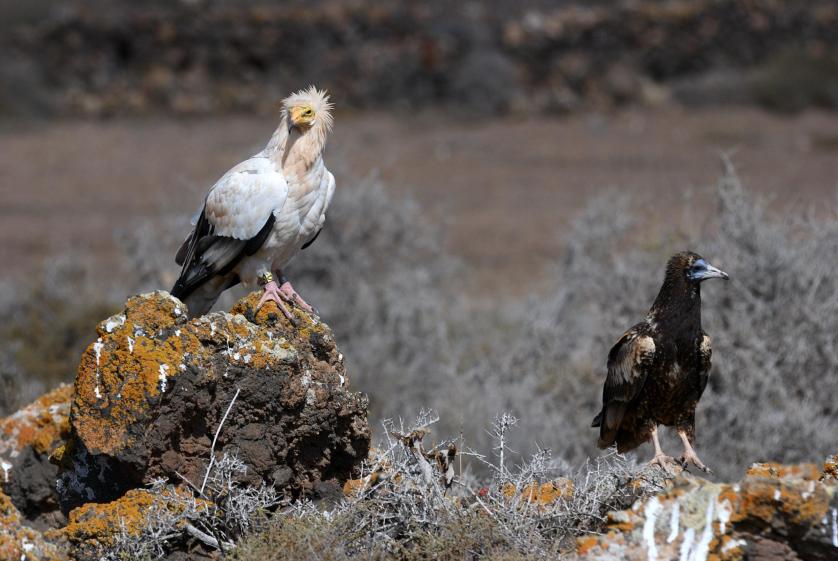El guirre canario estuvo al borde de la extinción a finales del siglo XX. En aquel momento, se detectó que el plomo era un grave problema para la supervivencia de su población.
El trabajo ha sido posible gracias al seguimiento que desde 1998 realiza la Estación Biológica de Doñana en colaboración con las autoridades canarias.
La prohibición de la caza de conejo con escopeta y con perdigones de plomo en la Isla de Fuerteventura ha posibilitado que los niveles de este peligroso metal se reduzcan en la sangre del guirre canario (Neophron percnopterus majorensis), una subespecie de alimoche endémica del archipiélago que se encuentra en peligro de extinción. El estudio, que acaba de ser publicado en la prestigiosa revista Environmental Research, ha sido realizado por un equipo científico de la Universidad Complutense de Madrid, la Universidad de Granada, de la Estación Biológica de Doñana y el Instituto de Investigación en Recursos Cinegéticos, ambos centros del CSIC, y con la participación del Gobierno de Canarias.
El trabajo ha sido posible gracias al seguimiento que desde 1998 realiza la EBD en colaboración con las autoridades canarias, lo que ha permitido tomar regularmente muestras de sangre de ejemplares capturados vivos para su marcaje y anillamiento. El análisis de 344 muestras tomadas entre 1999 y 2022 demostró que los niveles de plomo en sangre, indicativos de una exposición reciente al metal, descendieron en paralelo a la prohibición en 2010 de la caza de conejo con escopeta, que pasó a estar autorizada únicamente en la modalidad de captura con perros. Otros factores que, a priori, podrían haber estado implicados en este descenso, como el declive en el número de cazadores, el cual ha sido importante durante el periodo de estudio, no tuvieron la misma relevancia estadística.
Un factor que puede estar ayudando a su recuperación
El guirre canario estuvo al borde de la extinción a finales del siglo XX cuando llegaron a contabilizarse poco más de 20 territorios ocupados y un total de 100 ejemplares. En aquel momento, se detectó que el plomo era un problema serio para la relicta población de guirres. Llegó a comprobarse incluso que la acumulación de plomo en los huesos en sustitución del calcio reducía su mineralización haciéndolos más frágiles. "El plomo puede provocar desde la muerte del individuo, a dosis elevadas, a graves problemas reproductivos, como infertilidad o menor supervivencia de los pollos, dado que puede ser transferido por las hembras al huevo" afirma Rafael Mateo, investigador del IREC-CSIC y responsable de los análisis de laboratorio.
Hoy en día, 25 años después, la población se ha quintuplicado gracias a la eficacia de medidas de conservación tomadas por las autoridades canarias y dirigidas fundamentalmente a reducir la mortalidad no natural. "El caso del guirre canario es un ejemplo paradigmático de cómo cuando ciencia y gestión van de la mano y cuando se cuenta con un importante apoyo social, como ocurre en Fuerteventura y en Canarias en general, se pueden lograr éxitos muy notables en la conservación de especies muy amenazadas" comenta José Antonio Donázar, responsable científico del seguimiento del guirre en el equipo de la EBD-CSIC.
A esta recuperación de los guirres puede haber contribuido también el descenso en los niveles de plomo observados en este estudio. No obstante, aún se detectan altos valores de este metal en sangre, especialmente en individuos adultos. Esto es debido a que tiende a ser acumulado de forma crónica en los huesos y puede ser movilizado ante requerimientos de calcio, como la puesta de huevos. También se debe al hecho de que los individuos más jóvenes se alimentan preferentemente de carcasas procedentes del matadero, en puntos de alimentación suplementaria.
La solución pasa por la prohibición total del plomo para la caza
Pese a la prohibición de caza de conejo con munición de plomo, otras especies, cinegéticas y no, continúan siendo cazadas con escopeta, como palomas, perdices o incluso ardillas. Estas especies también forman parte de la dieta del guirre, por lo que suponen la principal fuente de incorporación de este metal, en una isla que, a día de hoy, carece de industria pesada y otras fuentes de contaminación.
Según Laura Gangoso, de la Universidad Complutense de Madrid y responsable de la investigación: "La erradicación de este problema pasa indefectiblemente por la prohibición total del uso de plomo para la caza. Se sabe desde hace mucho tiempo que el plomo es un metal extremadamente tóxico que causa enormes problemas ambientales y de salud humana. Cada año, por la caza, se vierten hasta 5000 toneladas de plomo en la Unión Europea. No existe ninguna razón técnica para que este metal no pueda ser sustituido por otros materiales. De hecho, este tipo de medidas ya están vigentes en humedales europeos, en numerosas áreas protegidas del continente e incluso en países enteros como Dinamarca".
Referencia
Gangoso, L., Mateo, R., Santamaría-Cervantes, C., García-Alfonso, M., Gimeno-Castellano, C., Arrondo, E., Serrano, D., van Overveld, T., de la Riva, M., Cabrera, M., Donázar, J.A. 2024. Blood lead levels in an endangered vulture decline following changes in hunting activity. Environmental Research. https://doi.org/10.1016/j.envres.2024.118712
Contacto
prensa @ ebd.csic.es



 Las limitaciones a la caza con plomo reducen las concentraciones de este metal tóxico en la sangre de los guirres canarios
Las limitaciones a la caza con plomo reducen las concentraciones de este metal tóxico en la sangre de los guirres canarios



